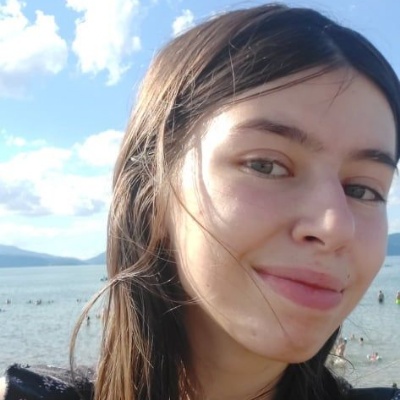Nela

and relying on your environment
The type of honey a family of bees makes depends on their surroundings. If the beehive -- typically a wooden box with 10 frames full of hexagons -- is put, for example, by the river Vardar, the worker-bees will have access to all kinds of flowers that enjoy the open, humid environment. The result will be a light, meadow honey. If, however, one puts the beehive in between trees, in a denser setting, the bees will tend to produce a darker, forest honey. Wherever they are, the bees will use the opportunities around them -- and if there isn’t enough flowers in one place, they can easily be “moved” so they can reach their potential.
Nela grew up in Kavadarci, at the edge of the city, in a part which (she jokes) only received street lighting last year. She’s been helping her beekeeping parents since she was a kid, and she could vividly -- literally, with videos on her phone -- explain to me the nuances of the trade. So far, she’s experienced almost every step of the laborious honey-making process, from making the frames and forming the hexagons (in which the bees store the honey), to placing the honey in a centrifuge which separates it from the wax (which the bees use as packaging), to relocating the beehives from one environment to another (so they get access to more pollen).
Like the worker-bees she cooperates with, Nela has an incredible ability to get the most out of the surroundings, and even to contribute to their improvement. I’ve yet to hear of an activity in Kavadarci she hasn’t tried. Karate. Dance. Piano. Archery. Drama. When the opportunities are provided to her, Nela makes use of them; when they aren’t, she’s ready to make them herself. She founded a branch of the Fridays for Future movement in her hometown, working to introduce her community to the effects of climate change. (Her family has already experienced some of them, because higher temperatures tend to mean less honey). Aside from the formal organization, she influences her social circle on a personal level: her friends now take their own bags when going shopping.
By the end of middle school, when it was clear that there wouldn’t be enough students in Kavadarci to form a foreign-language class in the city’s high school, Nela went to Veles and enrolled in the technical school, planning to become a nurse. Her decision means that Nela’s already experienced life in a dorm, and she’s already learned that it takes continuous efforts to succeed in an environment that lacks an authority figure to tell her to finish her homework. That’s why she believes she’s ready for chemistry and biology in UWC, even though she’s open to finding herself and trying out a number of unfamiliar subjects.
In August, when she arrives in Wales to begin her first year at UWC Atlantic, Nela might join their beekeeping club. Or she might not; that world’s already familiar to her. Regardless of what she decides, one thing is certain: this worker-bee is now moving to an environment with many, many more flowers. We’re eager to see the honey that comes out of it.
Bobo Stankovikj, June 2021
